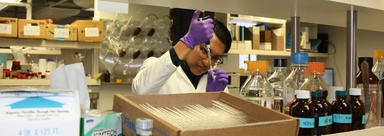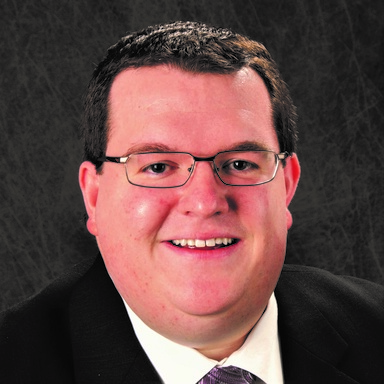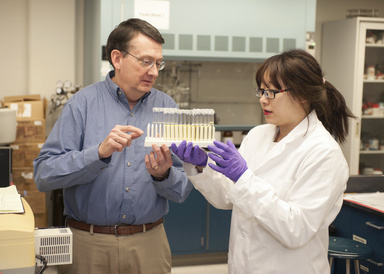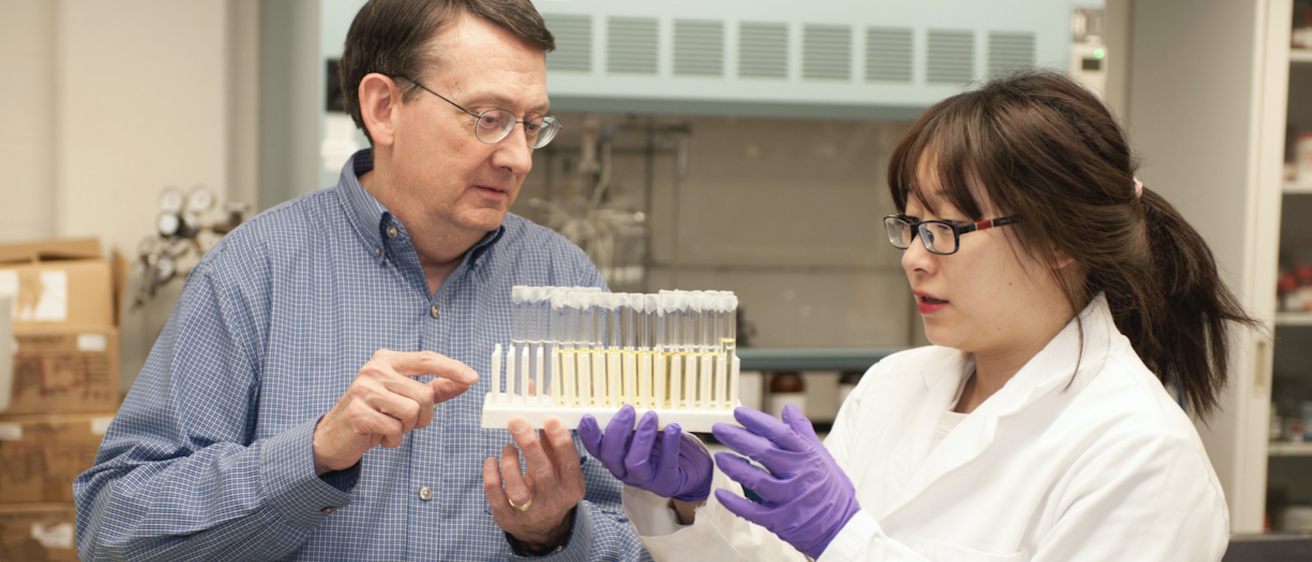Graduate students in UI College of Pharmacy's Pharmaceutical Sciences and Experimental Therapeutics (PSET) Department labs are not all traditional students working toward a PhD in Pharmacy. They have multiple paths to success to choose from, thanks to dedicated faculty members and various funding sources and collaborations.
"Graduate students in our faculty labs might have different coursework requirements or be in a different graduate program, said Robert Kerns, BS, ’96 PhD, the chair of the department. "Either way, they are indispensable to research productivity.”
Some of the students are shared between various colleges and departments across campus. About 20 percent are completing extra coursework and training to further enhance their graduate education.
Faculty and students in the PSET Department conduct fundamental and translational research and practice in a way that advances biomedical science. Their discoveries can lead to breakthrough drug therapies.

T32 Grants: Icing on the Top of the Traditional PhD
As of last year, six PSET faculty members were actively training nine graduate students who have been awarded training positions on “T32” grants.
These types of students still graduate with a standard PhD in Pharmacy. But they also take additional coursework and do extra training in the pharmacological sciences or biotechnology. The National Institutes of Health (NIH) grants pay for trainees’ tuition and fees, a stipend, and some program costs. The agency wants the bright new researchers to fill badly-needed job areas of shortage. It expects that graduates will keep searching for answers to the country’s health-related issues.
Biotechnology T32
One of the students—Arturo Aguirre, a 2019 PhD in Pharmacy graduate—completed two internships and took additional classes of interest as part of his T32 grant in biotechnology.
“The T32 fellowship pushed me into industry, and I found what I loved to do,” said Aguirre, now a research scientist for Regis Technologies in a Chicago suburb.
Kerns is the director of the biotechnology T32 program. Internships in industry are a highlight of that program.
Pharmacological Sciences T32
The college’s other T32 program is in the pharmacological sciences, and its hallmark is a course on advanced problem solving.

One student might be an expert in animal studies, and another might be an expert in molecular biology. They actually need to work as a team to write their own grant proposals... .
“The T32 provides an extra layer of training,” said Dave Roman, BS, PhD, associate professor, who co-directs the flagship course. He also serves on the program’s executive committee as co-director of the training program. Its trainees come from six departments and four interdepartmental graduate programs in three colleges, by the most recent count. They are bound by a shared interest in the dynamics, structure and function of drug molecules and their biological targets. Along the way, they build relationships with possible future research collaborators from various disciplines, and learn that each student has a different, necessary, perspective.
“One student might be an expert in animal studies, and another might be an expert in molecular biology,” Roman said. “They actually need to work as a team to write their own grant proposals based on a real-life research problem that doesn’t have a solution, which is posed by a guest faculty lecturer from one of the departments.”
The T32 awardees also learn modern methods of science communication, about ethical issues, and to make sure their research is able to be reproduced by others.
Graduates end up in a variety of career paths, Roman said. Some have been surprising and off-beat: a bioterrorism expert here, an expert on big data there. More common areas are medical writing, patent law, or working for an academic research center.
The formal name of T32 grants are the Ruth L. Kirschstein National Research Service Awards. Some T32 awards also go to scholars who have already received a doctorate degree. As of last year, the college had one postdoctoral researcher with a T32 from the François M. Abboud Cardiovascular Research Center of the Carver College of Medicine, working under Ethan Anderson, BS, PhD, an associate professor in PSET.
Interdisciplinary Graduate Programs: Mixing Pharmacy and Other Disciplines
Other graduate students who PSET claims as their own are working towards interdisciplinary degrees that incorporate pharmaceutical science with other disciplines. At the last check, current such students were set to graduate with degrees in Human Toxicology and Neuroscience. Such students are taught by and work in the laboratories of faculty members from across the university, including the College of Pharmacy.

Duo “Carina” Zhang, an international student from China, is working toward a PhD in Human Toxicology. Toxicologists study the nature, effects, and detection of poisons. Zhang got her bachelor’s degree in Biochemistry with a minor in Chemistry. She said she was drawn to the field because “it connects so many different areas like chemical engineering and pharmaceutics.”
As required, Zhang rotated through three campus laboratories. Then she stayed in the lab of Michael Duffel, PhD. Duffel is a professor in the PSET Department and the College of Pharmacy’s associate dean for research and graduate programs. Zhang joined Duffel to conduct basic research to provide vital insights for other scientists to use when designing better drugs and fighting toxic chemicals.
“After graduation I want to keep improving patient care in the pharmaceutical industry or a public health agency,” Zhang said. Her thesis is related to the Iowa Superfund Research Program, and toxicity of polychlorinated biphenyl compounds in humans.
Other
When they are not formally involved as faculty trainers, PSET faculty assist in various ways to keep programs humming. They also advise and contribute their expertise to graduate students from other programs on campus: including those earning PhD degrees in biochemistry, chemistry, engineering, cancer biology, molecular medicine, and other areas. For example, a faculty member might deliver an occasional lecture, or sit on a PhD candidate’s supervising board.
One example of note: Bighley Chair and Professor of Pharmaceutical Sciences Aliasger Salem, PhD, has had an otolaryngology surgical physician resident conduct research with him for two years while supported by a postdoctoral T32 research fellowship. At the end of the research period, he will return back to his surgical residency training.
While the PSET department has the large majority of the T32 grants and interdisciplinary students in the college, Linnea Polgreen, associate professor in the college’s clinical department (Pharmacy Practice and Science), also has works with interdisciplinary graduate students.
